Robert d'Orbigny
Floire and Blancheflor: Part III
Translated by A. S. Kline © Copyright 2023 All Rights Reserved
This work may be freely reproduced, stored and transmitted, electronically or otherwise, for any non-commercial purpose. Conditions and Exceptions apply.
Contents
- Floire returns to the tower.
- The porter’s plan is badly executed.
- Floire is discovered by the wrong maiden.
- Who conceals his presence.
- Floire is reunited with Blancheflor.
- The lovers converse.
- They remain together for a fortnight.
- Fortune’s fickleness.
- The Emir misses Blancheflor.
- He sends his chamberlain to seek for her.
- The Emir discovers the lovers.
- He threatens to slay them.
- His hand is stayed.
- The Emir summons his lords to judge the case.
- He addresses the assembly.
- A subject king argues for due consideration.
- Another argues the contrary.
- Floire seeks to take the blame.
- Blancheflor seeks the same.
- The like beauty of the pair of lovers.
- The description of Floire.
- The description of Blancheflor.
- The pair are led to the city square.
- The Emir questions them.
- Each seeks to be the first to be slain.
- A plea for mercy.
- Floire refuses to betray his helpers.
- The priest advises they be pardoned.
- Floire, once pardoned, tells his tale.
- The Emir then pardons Blancheflor.
- Floire weds Blancheflor, and the Emir weds Gloris.
- The double wedding festivities.
- The description of the wedding feast.
- Floire hears of his father’s’ death.
- The lovers seek leave to depart.
- Floire showers gifts on his host.
- The lovers return home and Floire is crowned king.
Floire returns to the tower
Floire now returned to the tower.
The porter had it in his power
To present him to the fair array
Of ladies there, on the third day.
Flowers he’d ordered to be brought
Basketfuls would his plan support.
Thus, Floire arrived, as appointed,
Praying he’d not be disappointed.
A tunic he wore of crimson hue,
The porter advised him so to do,
So that the flowers and his dress
The very same colour did possess.
The porter despatched that same hour
Those flowery gifts to the tower.
A giant basketful for each lady,
Guaranteed to gain Floire entry.
Floire closed his eyes, oped them not,
And the porter carried out his plot;
Floire in a basket, hidden, did go,
Covered in flowers from head to toe.
For the porter instructed his men,
‘Carry all those within, and then,
On ascending the tower, be sure
To bear this one to fair Blancheflor;
Go to her room, tis by the stair
Above the Emir’s chamber there,
And say he sends to her a gift;
I think you will be thanked for it,
For she will hold that present dear;
Then lose no time returning here.’
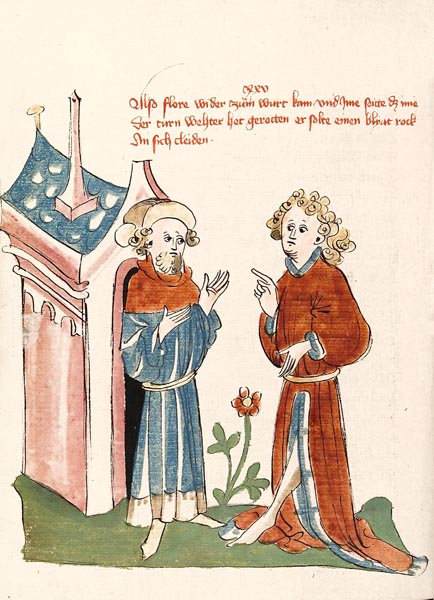
‘Floire dresses in a red skirt’
Floire dresses in a red skirt
The porter’s plan is badly executed
So, the baskets they bore off straight,
Two staggering under the weight
Of that which held our Floire; they swore
At the heaviness of what they bore,
Puffing and panting climbed the stair,
And at the top no more could bear.
They left the basket for Blancheflor,
But set it down at the wrong door.
And leaving thus the flowers behind,
Abandoned them for whoe’er to find,
Shouted out their message, and then
Down the stairs they vanished again.
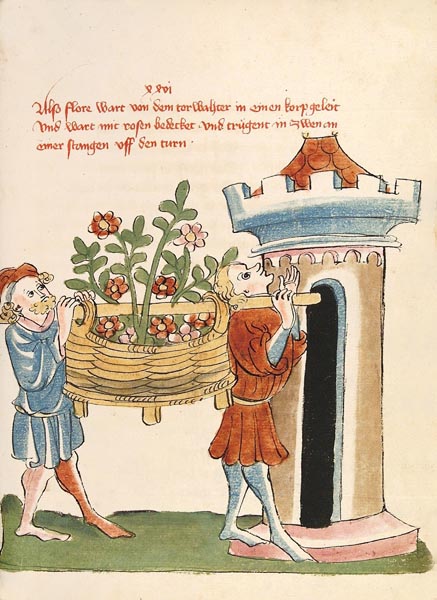
‘The flower baskets are carried into the tower’
Floire is discovered by the wrong maiden
The maid within, with thanks, replied,
And sought to know what was inside,
Pleased by the gift left by the pair.
Floire thought it was his lover there.
Hearing the maid, filled with delight,
He leapt from the basket outright,
And nigh on frightened her to death,
While she, having taken a breath,
Cried aloud, and most forcefully,
‘Ah! What is this wonder I see!’
Floire leapt back in the basket straight,
Wondrously fearful of his fate!
As twas not Blancheflor, this maid,
He thought he’d surely been betrayed,
And hid himself amidst the flowers,
As one beneath the verdure cowers!
Who conceals his presence
Her companions, hearing the maid,
Soon arrived and, once present, bade
Her say what caused her cries of fear,
For no other was there, twas clear.
They sought to reassure her, while she
Thought of Blancheflor, suddenly,
For she was her friend, and well knew
How Blancheflor her plight did rue,
And pined for her lover; so was wise
And hid the cause of her surprise:
‘From the flowers flew a butterfly,
And that was the reason for my cry,’
She said, ‘it caused my show of fear,
For I was scared when it drew near.’
They all mocked her, once she’d explained
Then left, while she alone remained.
This maid kept Blancheflor company,
Her father was king of Germany.
The two maids loved one another,
And served the Emir together.
She was the loveliest, to be sure,
In that tower, but for Blancheflor.
Never a quarrel had they there,
Into her chamber she would repair,
Blancheflor’s, I mean, she often sought.
Oft she spoke, the other said naught,
For night and day Blancheflor wept,
While the maid her company kept.
Their rooms were next to each other,
With a door twixt one another,
By which they might change location,
If they wished for conversation.
Gloris she was called, that same.
Blancheflor, she now summoned, by name.
‘Fair companion, my Blancheflor
Come now, and view the gift they bore.
For my discretion you’ll love me,
For quite the rarest flower you’ll see.
Such as grows not in this harsh land;
Tis from afar you understand.
Come, if you would view the flower,
Come, view it here, in my own bower.’
Floire is reunited with Blancheflor
‘Enough! Gloris’ cried Blancheflor,
‘Why annoy me? Do so no more.
For you are wrong to tease me so,
By my faith, when I beg you no.
Flowers are for those who have their love;
Joy and delight such hearts do move.
Fair sweet Gloris, fair friend, I near
The end of my brief life, tis clear.
The Emir says that he will prevail,
Yet, if God please, his plan will fail.
The Emir will have my love no more
Than Floire will have his own Blancheflor.
The Emir foiled of his victory,
Will seek to slay me secretly,
I wish for husband nor lover,
If Floire’s lost to me forever.’
For her, at this, Gloris, felt pity
And spoke to her again, gently:
‘Sweet lady, tis for love of you
These flowers I would have you view.’
When to her love her friend referred,
Blancheflor entered without a word.
Floire heard all that they did share,
And when he knew his love was there
He leapt from the basket, with glad face;
No finer lad the world did grace.
She knew her lover instantly,
And he his own true love did see;
He saw his love; hers she did view;
Who was more joyful than those two?
Without a word, they clasped each other,
Filled with delight to be together.
In love and pity, tears did pour,
From Floire and his dear Blancheflor.
In one another’s fond embrace,
They lost themselves, kissing apace;
Of kissing they were scarcely done,
Who were united now as one.
Their kisses were of love full sweet,
Savouring of a love complete.
When they ceased, no word was said,
The simply smiled, and gazed instead.
Fair Gloris viewed their contentment
Their joy, and mutual commitment,
Laughing she said to her Blancheflor:
‘Companion, what would you more?
Know you this flower? You were in woe,
And now delight it is you show!
Great virtue lies then in this flower,
That o’er sadness has such power.
Before, the gift you would not view
And now naught is so dear to you.
Great must needs be an enemy
To part you two, it seems to me.’
‘Praise be, Gloris!’ cried Blancheflor,
‘Here is my friend, I ask no more!’
And, turning to her, cried anew:
‘He’s beside me, thanks be to you.’
Gloris gave thanks to God (and she
Uttered those thanks most tearfully)
That she had not betrayed his plan,
Or Floire must needs be a dead man.
‘Of this be sure,’ was her reply,
‘That none could love you more than I,
And I will protect you both, I swear,
As I would myself, howe’er I fare,
Since thus he is revealed to me.’
Floire heard her words most joyfully.
Then Blancheflor led him by the hand
To her chamber, hers to command.
The lovers converse
In a recess, with a curtain
Of woven silk, where the maiden
Rested, they sat privately,
Exchanging their thoughts urgently.
Floire was the first to speak his mind,
‘My love, that you I thus could find,
Fills me,’ he said, ‘with deep delight,
My suffering ended at the sight
Of your face; I was near to death,
Labouring hard with every breath.
Never have I, since I lost you,
Found rest or happiness anew.
If I but have you by me still,
It seems to me I feel no ill.’
She replied: ‘Are you not that Floire
Who was sent away to Montoire,
And so was reft away from me,
By the king, your sire, or treachery?
Fair sweet friend, I’d have you know
That I love you, and e’er did so.
And so have felt joy and delight,
Neither in daylight, nor at night.
How is it I see you, my dear?
Tis by enchantment, you are here.
Fair sweet friend, Floire, I see tis you,
Yet scarce believe the thing is true.
If it be you, and I see aright,
Enjoy your love; in her, delight!’
And that he did, most lovingly,
Embracing her there, privately.
After that, he told Blancheflor how
He’d searched for her, until now,
From the day he’d departed, that is,
Until this day, when she was his.
They remain together for a fortnight
Fifteen whole days they were there,
Ate and drank together, that pair,
And, as they wished, took their delight.
Sorrow forgot; their hearts were light.
Gloris made sure to guard them still,
And serve their interests with a will.
And fair Gloris they served also,
Thus, all was well, time brought no woe.
Their hidden life continued so,
No alteration, nor some ill blow,
Threatening the love betwixt those two,
Floire and Blancheflor, now joined anew.
Fortune’s fickleness
It could not last; fickle as ever
Fortune changed with the weather,
And showed the envy that claims her
In respect of every lover.
Unable her envy to conceal
Of their life and love, she spun her wheel.
From on high all must fall below,
And, once above, now down must go.
Such is her nature and her game,
Her intent is ever the same.
The whole world knows thus they may fare,
For all folk feel her everywhere.
Since that her being is unstable,
Fortune ever turns the table,
Takes from one, gives to another,
Eight times a day changing, ever.
She gives not of her rich excess
To those with talent or prowess;
But rather she grants royalty
To fools, wealth and lands a plenty;
She makes fine clerics seek their bread,
Bishoprics go to rogues instead.
Who thinks to put his trust in her,
Is but a fool, the wise concur.
Who thinks she’ll guarantee success,
Knows nothing of her fickleness.
She brings now laughter, and now tears,
Now joy, now woe, now hopes, now fears.
She’ll grant us pleasure and delight,
Then anguish, and the darkest night.
The Emir misses Blancheflor
One morning, Gloris rose and dressed,
As the daylight the heavens blessed,
And called to wake her fair Blancheflor,
Who answered: ‘Go you on, before.’
Twas sleepily the maid replied,
Then back into her sleep did slide.
Gloris went to serve the Emir,
Who asked why she alone drew near,
Why fair Blancheflor was not in place,
‘Sire, forgive the maid, of your grace!
All night her book she did employ,
Praying that you might live in joy,
And since she scarcely slept all night,
She sleeps more deeply, now tis light.’
‘Is this the truth, Gloris?’ ‘Sire, yes!’
‘A noble task then she did address.
Kindness itself my love must be,
That wishes thus long life to me.’
The Emir took pity on the maid
Who such care of him had betrayed.
On the next day Gloris arose,
Before the other, from her repose,
And called out softly to her friend:
‘We are late, and must swift descend.’
Blancheflor replied: ‘I’m ready now;
I’ll be there before you, I vow.’
Yet once more Blancheflor’s lover
Clasped her and she him, foolish ever;
Then she kissed him, he kissed Blancheflor,
And kissing they fell asleep once more,
Lips to lips, in that sweet embrace,
They slept together, face to face.
Gloris went off to the pillar
With a basin to draw water.
When she returned, she called, softly:
‘Fair maid!’ four times, then more loudly.
But receiving no reply, instead,
Thought Blancheflor had gone on ahead.
She entered the Emir’s chamber,
‘Where is Blancheflor?’ he asked of her.
‘By my faith, she must fear me,’ he said,
To linger, and come not near my bed.’
Gloris most thoughtful did appear:
‘By my faith, sire, I thought her here,
For she arose before me this day.
As she is not here, I shall stay.
If she’d been able, she’d be here,
She was delayed, it would appear!’
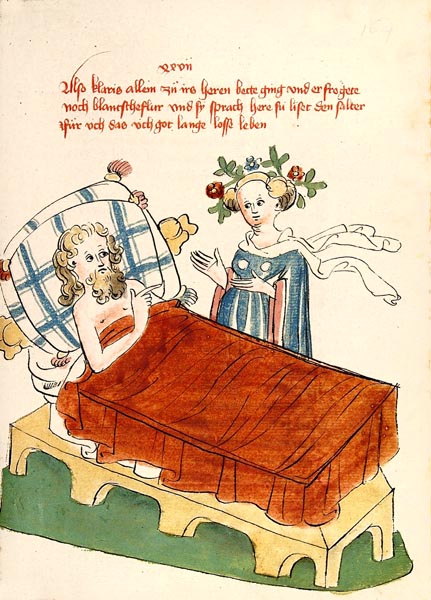
‘Gloris explains Blancheflor’s absence to the Emir’
He sends his chamberlain to seek for her
The Emir, too, was deep in thought.
At last, his chamberlain he sought:
‘Go, seek Blancheflor, see that she
Descends the stair, and rapidly.’
The chamberlain noticed not Gloris,
And retired above, speedily.
When he had climbed to the chamber
Neath the canopy, in the corner,
In bed, he thought he saw Gloris
And Blancheflor, sleeping peacefully.
Why should he not think it so?
Upon Floire’s face no beard did show,
Not a moustache appeared to sight,
All that was there seemed aright;
Naught but two maids he thought he saw
The fairest that the tower bore.
Seeing those maidens resting there,
So sweetly, he pitied the pair,
Was abashed by the sight, and fled
To report to the Emir instead:
‘Sire, a fair sight I have seen!
Ne’er a greater love has there been
Than that of Blancheflor for Gloris,
And she for her, it seems to me.
Lip to lip there, and face to face,
They are resting in fond embrace.
Sweetly there they lie together,
Fast asleep, one and the other.
I wakened them not, out of pity,
Fearing lest I trouble them greatly,
For well suited they thus appear.’
Gloris heard, and trembled with fear.
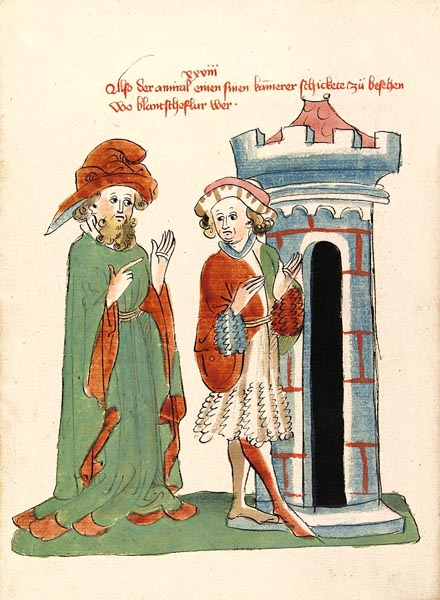
‘The Emir sends his chamberlain to the tower’
The Emir discovers the lovers
The Emir was gripped by jealousy;
Another lay with his love, said he:
‘Bring me my scimitar,’ he cried,
‘I shall go see what you have spied.
Gloris, you’ve failed me, for your part!’
Then he arose with troubled heart.
Afflicted, indeed, with pain was he
Angered deeply, as all could see.
At once he left his own chamber
Burning with jealousy’s dark fever.
Though he believed none would dare
Seek to possess his own love there,
Nonetheless, Amor, by his art,
Roused jealousy within his heart.
He and his chamberlain, instantly,
Mounted the stair, while, angrily,
He grasped his scimitar in his hand,
And soon before the bed did stand.
The window had been opened wide
To welcome the sun’s rays inside.
The lovers were sleeping, sweetly,
Clasped in a tight embrace, and he
Saw they were resting lip to lip,
Scarce dreaming, as they lay hip to hip,
That joy would end in woe outright
If God now failed to aid their plight.
The chamber was all filled with light,
The risen sun was shining bright,
Up to the heavens soared the lark.
Yet when he saw them, all grew dark;
He saw that the one was Blancheflor,
The other he’d ne’er seen before.
Floire beside his love lay there,
But from his face none could declare
Whether this was a man or no,
For on that face no beard did grow,
And, except for the fair Blancheflor,
No fairer a visage that tower bore.
The king gazed hard but knew him not;
Jealousy pierced him on the spot.
Such is the nature of Love that he
E’er makes the lover fear treachery.
The Emir cried: ‘Come, bare their chests,
Good chamberlain, their naked breasts
We shall view, ere we wake this pair,
Both we’ll have revealed to the air.’
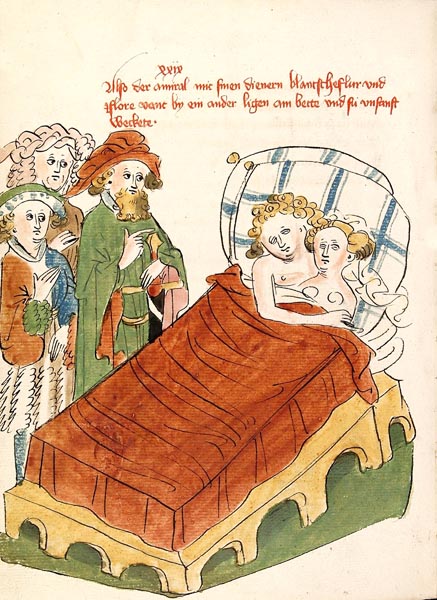
‘Floire and Blancheflor are caught in bed together’
He threatens to slay them
Their breasts uncovered, the Emir saw
That a youth lay beside Blancheflor.
He felt such grief he said not a word,
And sought to slay the wretch unheard,
But then he thought that he should know
The rogue’s name, ere he slew him so.
The two young people woke together,
Astounded, fearful to discover
The Emir standing close nearby,
Deeming they were about to die.
The saw the naked blade hover,
And in their hearts felt its tremor.
Now the Emir had caught them so
They awaited the mortal blow.
Now were they troubled, full of woe,
Waking to see their mortal foe.
Floire wept, as did Blancheflor,
Viewing that blade the Emir bore.
While the Emir was full of anger
Finding the two there together.
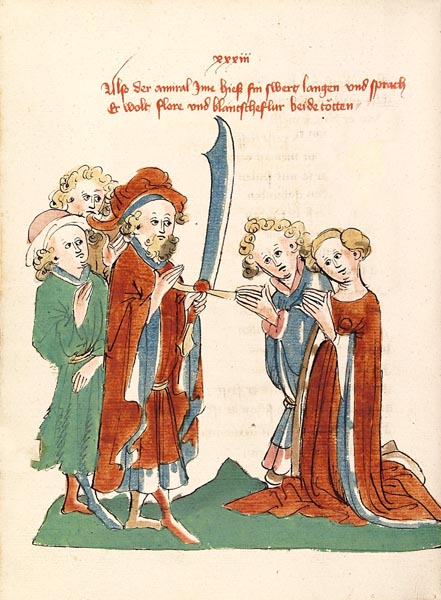
‘The Emir seeks to kill the lovers kneeling before him’
His hand is stayed
He questioned Floire: ‘Who then are you,
The boldest rogue I e’er did view,
Who dare to enter, thus, my tower,
And lie with Blancheflor, in her bower?
By all the gods that mortals honour,
You shall die now, in dishonour!
Both now must die, and here I stand,
Ready to slay you with my own hand.’
The youth and maid wept together,
And gazed with pity at one another.
Floire cried: ‘For God’s sake, say not so!
Aught but that, for you should know,
She is my love, and I, her lover;
Long I searched, her to discover.’
Then the Emir’s seneschal cried:
‘My fair lord, let the two be tried;
Till your people have heard the pair,
Pass no judgement on this affair.’
The Emir summons his lords to judge the case
This was granted, he had them rise
And they were bound before his eyes,
That they might not escape their fate.
He summoned the lords of that state,
Who were gathered not far away,
Within the city, against the day,
Which was close by, when the Emir
Chose his companion for that year.
Came many a king and emperor,
Dukes and counts, many a leader,
To fill the palace of the Emir;
All those he ruled did thus appear.
He made them all stand silent there
To hear his thoughts on that affair.
On hearing his wish and command,
None spoke, indeed, on either hand.
Then he mounted the platform, his heart
Still filled with anger, for his part.
‘Lords,’ said he, ‘now hear my word,
And pass judgement on what is heard,
And he who wavers from the right
Shall meet his death ere it be night.’
Those who were bound to the Emir
Shuddered indeed his words to hear.
He addresses the assembly
‘My lords,’ said he, ‘you all do know
Of this Blancheflor, who to my woe
I purchased, for a weight of gold;
Many an ounce it was, all told,
And this was but two months ago;
Eight times her weight I gave, or so.
Fairer than all she did appear,
And thus, I held the maiden dear.
In my tower she dwelt, for, there,
Dwell twenty-eight maids, each one fair,
To serve all my needs, with honour.
I held her dear o’er every other.
I had such love for her, by my life,
I wished to make the maid my wife.
Because she was noble and fair,
My passion was invested there.
Each day she would come to me,
On rising, to serve me, graciously.
Yesterday morning, twas my lot
That, on awakening, she came not.
I sent my chamberlain to find her;
A youth he found sleeping by her,
Whom he mistook for a maiden.
He returned to tell me of them.
As swift as I could, I went to see,
And gazed on the pair, most angrily,
So grieved I could not speak a word.
I seek their deaths, as you have heard.
My lords, tis all as I have said.
My chamberlain begged me instead,
That before you, in our court here,
I should seek your judgment clear.
I reflected that twould be ill,
Without your counsel, thus to kill.
My lords, you all have heard my case,
Avenge my shame now, in this place.’
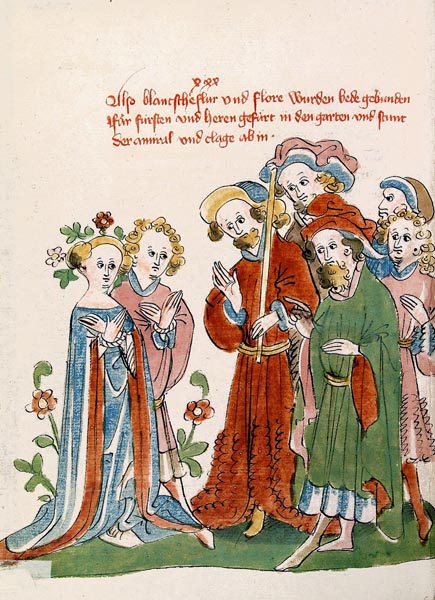
‘Floire and Blancheflor are charged’
A subject king argues for due consideration
A subject king rose to his feet,
And answered: ‘My lords, I entreat
You all to hear me; you know now
The shame neath which our sire doth bow,
Nonetheless, we should hear more
Ere we pass judgement on Blancheflor,
And on this youth, lest they can say
A word that might our judgement sway.
To deny their right to reply,
Ere we judge, lacks justice, say I.’
Another argues the contrary
Lord Yliers, on the other side,
A proud and mighty lord replied:
‘Royal sir, think what you will,
You must concede the matter still.
If our Emir purchased the maid,
He may slay her, if thus betrayed,
And he who has stolen the prize
Can make no valid plea, likewise,
Their crime was revealed openly,
Thus, they should die, of a surety.’
Floire seeks to take the blame
Then all the lords rose to their feet,
The whole assembly there complete,
When he had spoken, and declared
The judgement that they be not spared.
He said: ‘Sire let me bring them here,
That they may burn; the judgement’s clear.’
His request was granted; he, before
Them all, led Floire and Blancheflor.
They came to that forum, weeping,
Each the other’s visage seeking.
Floire, to his fair Blancheflor, did cry:
‘My love, we are thus bound to die,
Both doomed to utter our last breath,
In a short while, and meet one death.
Yet, my love, who yielded to me,
Your woeful ending is due to me.
For if I’d not entered the tower,
Death would not have you in his power.
Twas not through you this came to be;
Now you must lose your life through me.
Twice such a death I should suffer,
If that were allowed by Nature,
Once for yourself, once for my part,
For this is all my fault, dear heart.
Yet, hold tight to the ring I gave you,
While you have it, none can slay you.’
Blancheflor seeks the same
Blancheflor, as she wept, replied:
‘My love, the fault is on my side!
My sweet friend, Floire, in a breath,
Tis I that bring about your death.
You had come to this far country
Wishing only to seek for me.
I alone am the occasion
For my woe; I, the sole reason.
On me the judgement then should fall,
Take back your ring; let me bear all.
I’d not wish to escape death so;
To die for you shall ease my woe.’
Yet a just God would not allow
That either one to Death should bow.
The fair Blancheflor yielded a sigh,
Affirming that he must not die,
Saying, again, he should take the ring,
While he to his first plea did cling.
She wished not to retain, indeed,
A thing of which he now had need.
Once, twice, sweet words he did employ,
And when she wavered, showed his joy.
Yet Blancheflor said, it was not right,
The ring would gain her scant respite;
‘You’re in the wrong, my love,’ she said,
‘If you would seek to die instead,
For I well know when Death sees you,
He’ll seek me for my beauty too.’
‘Fair one,’ said he, ‘tis I should die;
Twas I did all befell thereby.’
Speaking so, the lovers came there
Weeping, hands clasped, one fate to share.
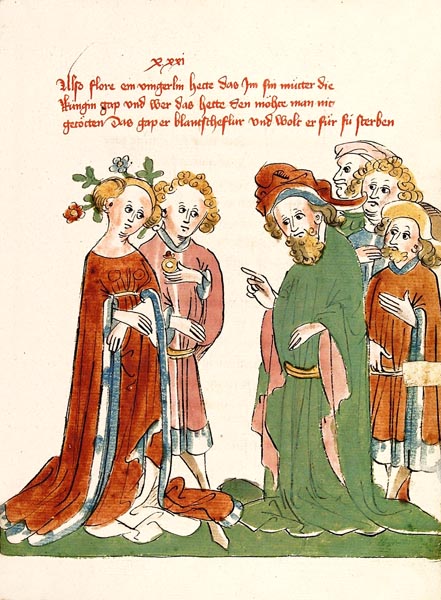
‘Floire gives Blancheflor his mother’s ring’
The like beauty of the pair of lovers
They were both told to keep the peace;
Once in the palace, talk must cease.
Then the pair were brought before
The Emir; Floire and his Blancheflor.
They saw the great lords gathered there;
Sad tears and sighs the two did share.
They had no hope that death would spare
Either, and yet they seemed so fair,
That their beauty, and their sadness,
Equalled the Moon in her brightness.
Not Trojan Paris, nor Absalom,
Parthenopaeus, nor Hippomedon,
Nor Helen who was Leda’s daughter,
Nor Antigone, nor her sister,
Ismene, equalled in beauty
Those two, that to death went sadly.
The description of Floire
Floire, the youth, appeared so fair
That none, at his age, could compare.
But fifteen years of age was he,
Yet tall enough, as all could see.
His head was shapely, with blonde hair
That floated free, as he wept there,
His brow noble, most pale indeed;
None living were of nobler breed.
His eyebrows dark in hue, yet slight,
No fairer youth ere met the sight.
His fine eyes were large with weeping,
None could be sated with gazing
Upon those orbs, in sheer delight,
That now with tears were shining bright.
His face was like the rising sun,
When radiant day is first begun.
At mouth and chin, his face was bare,
Lacking moustaches or beard there.
Solid flanks, broad in the chest,
Pale as a fleur-de-lys his breast,
Strong his arms, hands white as snow,
I think that no man there did know
A youth more handsome at his age,
Stronger, more valiant, more sage.
A purple robe the lad now wore,
His arms were bound, the ropes secure.
The description of Blancheflor
Half-dressed, likewise, was the maid,
As upon judgement she now stayed,
Her mass of hair was blonde also,
Whiter than ermine the brow below.
Her tresses were parted o’er her crown,
To her shoulders they straggled down.
Brown eyebrows, grey glittering eyes,
Brighter than jewels shone likewise.
None could match them for beauty;
Those who gazed upon her closely
Saw that those eyes were full of tears,
As one o’ercome with grief appears.
Her skin was that shade of colour
Clear glass reveals, none is subtler.
Her nostrils too were finely made,
As if by an artist portrayed;
Her mouth was traced in like manner,
Nature never wrought a better.
No fairer form had any maid,
No queen a lovelier displayed.
Her lips, in truth, were made to kiss,
A touch of crimson spoke of bliss.
Her teeth were small, and as bright
As polished silver in the light.
From her lips came a breath so fair,
One might live a week upon the air
That issued forth, so sweet it, still,
Full seven days later, eased all ill.
Her chin and neck were such as might
In any age arouse delight.
Her skin was pale as pale could be,
Whiter than blossom on the tree.
Her form was such, so finely made,
As if by an artist twas portrayed.
Slim were the flanks, the hips well-set,
Skill and art were there well-met.
Her hands white, the fingers slender
Long and straight, fine and tender,
Not a man, that she stood before,
Thought any nobler than Blancheflor.
At her beauty, all were astounded,
Their admiration unbounded.
None were so wretched it appears
As not to pity Blancheflor’s tears,
And the judgement all there would
Have overturned, if they but could.
Yet the Emir with wrath did glare,
Showing scant pity for that pair.
Judgement against them had been found,
And, upon that, the two were bound.
The pair are led to the city square
In the midst of the city square,
Three servants a pyre did prepare.
There the pair were led, together,
That the one death they might suffer.
When the nobles saw them bound,
Sorrowful murmurs rose around,
And most who viewed that sight shed tears
For lovers of such tender years,
And said an ill thing it would be
To see them die so cruelly.
And if they’d been able, and had dared,
Once ransomed, both lives they’d have spared.
The nobleman who’d found her ring,
(From her hand she had cast the thing)
Now returned it to her finger,
Seeking not to bear it longer,
So overcome was he with pity.
The Emir questions them
They approached the Emir slowly.
He, who’d heard the lamentation,
Swiftly put them to the question.
The Emir asked the reason why
The pair before him should not die.
He put the question to those two,
Asking of Floire: ‘Who are you?’
The youth replied: ‘My name is Floire,
I was far distant, in Montoire,
When this maiden was reft from me,
Whom I have found in your country.
I swear by the saints, she knew naught
Of my entry to the tower, nor ought
To face such torment as you employ.
If you yourself would come to joy,
Slay me and, in one, punish two,
For such should be the sentence due.
The wrong, the punishment, is mine,
She bears the judgement for my crime.’
Blancheflor was troubled however:
‘Sire,’ she cried ‘I am his lover,
And, by my faith, on account of me
He climbed the tower, so daringly.
If he’d known naught of Blancheflor
He’d not have done so, such is sure.
Ill the deed, if he died for me,
For tis a prince of Spain, you see;
Thus, he should live, and I should die,
If you would come to bliss, say I.’
Floire cried aloud: ‘Credit this not,
Slay me; let her part be forgot.’
The Emir said: ‘Nay, both of you,
Without delay, must die; the two,
The very same death, die this day,
And Paradise be mine; I pray.’
Each seeks to be the first to be slain
His naked blade he raised on high,
Blancheflor sought to be first to die,
But Floire drew her backwards swiftly,
‘You should not be the first,’ said he,
‘I am the man, it is not right
That you, ere me, should quit the light.’
He bowed his neck where he did stand,
Fair Blancheflor clasped him by the hand:
‘No, you are wrong!’ cried out Blancheflor,
And, weeping, set her herself before;
Each wished to be the first to die,
Yet the ring sought it not, say I.
Each felt pity there, in that place,
With so sad a sight before their face.
All the noblemen standing there
Wept to witness that sad affair.
Those who are pitied by so many,
We should not judge with enmity.
A plea for mercy
Then pity conquered the Emir,
Though anger sought still to appear,
Seeing each seek in turn to die
Before the other, while those nearby
Wept and their deep sorrow did show,
He could not give the word of woe.
Gazing on Blancheflor, that fierce lord,
Out of pure pity, sheathed his sword.
Those who looked on, in their delight,
Wept with joy, and pity, outright,
While the lord who’d found the ring
Gazed on her; above everything,
He saw that it was his place to speak,
And her pardon attempt to seek.
Thus, he turned to the company:
‘We must advise our lord,’ said he,
‘To hear a plea that’s to his honour.
My friends, we must do so, together.
For our Emir takes pity now
On these that to our judgment bow,
And Floire has not concealed the fact
That all this plan he did enact,
Saying how he entered the tower,
And lay with Blancheflor in her bower.
What would men say were he to die?
Such would yield scant justice, say I!
Much ill would others think if he
Were to slay the youth, ruthlessly.
Better twould be, so I believe,
To know all Floire did conceive,
And how he entered in the tower,
And who aided him at that hour.
The Emir might learn much from this,
A wealth of knowledge would be his;
Better to know the whole design,
So, its defences he might refine.
Such he will do, if he is wise.’
And thus, the lords did so advise,
That twould be ill to slay the two:
‘Release the pair, such is our view!’
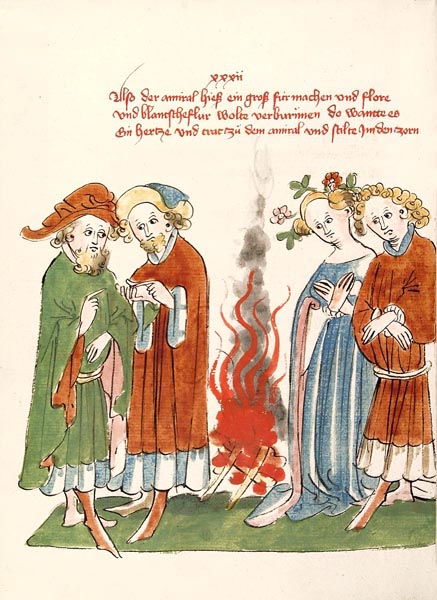
‘At the already burning pyre’
Floire refuses to betray his helpers
The Emir, on hearing their plea,
That twould be far better if he
Were to pardon both, did declare
That Floire to speak the truth must swear,
On his life, and Blancheflor’s too,
As to his plan, the how and who.
Floire replied: ‘I’ll not do so,
Though you’ve means to work me woe,
If you do not, in like manner,
Since o’er them you have the power,
Pardon the men, who aided me
With help and counsel, instantly.’
The Emir, greatly angered, cried:
‘The plea that you make is denied.
Rather the two of you I’ll slay,
For both of you must die this day.
I’ll entertain no such request,
But of your lives shall you divest.’
The priest advises they be pardoned
Then a bold priest leapt to his feet,
Who for their pardon did entreat,
On hearing the pleas and replies;
He was one considered full wise:
‘Fair sire,’ said he, ‘where is the gain,
If you slay him? Little, tis plain!
Do as your counsellors commend,
Let reason make of this an end.
This fair youth, Floire, it seems to me,
Owes naught to your authority,
And can receive no judgement here;
His realm is elsewhere, twould appear,
While to pardon those you can
Pardon is e’er the noblest plan.
Better to hear the whole design,
Than slay them, and justice resign;
For great harm the deed would do,
If you chose now to slay these two,
Whose beauty’s beyond all measure,
Finer than any wrought by Nature.’
All there cried: ‘Fair be the deed!
Grant their plea, Sire; be it agreed!’
Thus, all shouted, seeking mercy,
And, when the Emir heard, then he
Wished not to contradict his court,
And pardoned the pair, as he ought.
All his lords thanked him, most deeply,
And praised this act of royal pity.
Floire, once pardoned, tells his tale
The two prisoners were full of joy.
Floire his eloquence did employ
And spoke aloud for all to hear,
As, in silence, those lords drew near.
All that had happened he did say,
From his birth to that very day;
How he had loved her, out of hand,
How she’d been reft from out his land,
And of his sorrow then he told,
And how he’d issued from that hold,
To search for his true love, Blancheflor,
O’er land, then sea, from shore to shore,
And how to Babylon he did steer,
And how his host had held him dear,
And how he gave him counsel wise,
And how he’d fooled the guard, likewise,
How, in the basket, trembling, pale,
(They all held it a wondrous tale;
E’en the Emir was seen to smile!)
Into the tower, his skill and guile
Had seen him borne, then, stupefied,
By Gloris revealed, hid inside.
And how, on ascending the stair,
The Emir came to find him there.
His tale told, his answer complete,
Humbly he knelt at the Emir’s feet,
And begged him, for God’s sake, to free
His love, and let this matter be,
For if he lost her, in a breath,
Rather than live, he’d beg for death.
The Emir then pardons Blancheflor
Then the Emir gave his command
Before them all, clasping Floire’s hand,
That they should free the fair Blancheflor.
He took her hand, and Floire’s once more,
Then he spoke, and most graciously:
‘I render the maid to you,’ said he,
And Floire rendered his thanks, in turn,
Who need not for his love now yearn.
Both of them fell at the Emir’s feet,
And kissed them, their delight complete.
The Emir offered Floire redress;
He sought him as his knight, no less.
Of the thousand arms he possessed,
He now made Floire choose of the best.
Floire weds Blancheflor, and the Emir weds Gloris
Knighting him, the Emir then led
Floire and Blancheflor to be wed;
Thus, they were joined at last, that pair.
Then he summoned Gloris there.
Through Blancheflor’s counsel, the Emir
Married the maid, and held her dear,
While Blancheflor begged him, for God’s sake,
Since Gloris as his spouse he’d take,
When the year was done, not to slay
His bride but care for her alway.
And Floire too begged him so to do;
Fair Blancheflor then rejoiced anew,
For the Emir swore that he would
Honour her lifelong, as he should.
Gloris was overjoyed at this,
And she her Blancheflor did kiss,
A hundred times, from sheer delight.
The Emir led her forth, outright;
And a golden crown went with her,
While he her presence did honour,
And, once they had reached the great hall,
He crowned her there before them all.
The double wedding festivities
All the fine lords of Babylon
Gathered to feast there, every one,
And that same feast was full of joy,
For entertainers they did employ.
Lions were baited, and many a bear,
Minstrels, jugglers, they summoned there,
And instruments of every kind
Sounded before them, and behind.
And, from the greatest to the least,
Every guest had joy of that feast,
And even the worst minstrel there,
Earned four gold marks from that affair,
And a mule, and a decent cloak.
All the guests of their pleasure spoke.
Floire invited his host, and not
E’en the tower’s doorman was forgot.
Water to bathe their hands they sought,
Thus, the chamberlain had it brought,
That they might wash; and then all there
Laved their hands, and everywhere
Sat to the board, while his new bride,
Gloris, was placed at the Emir’s side.
And next to her sat fair Blancheflor,
With Floire at his love’s side once more.
Floire was seated beside his wife,
And gazed upon her more than twice.
Great joy he felt that she’d been saved,
And, therefore, many a kiss he braved.
Many smiled, throughout the great hall,
And, smiling, cried out, midst them all:
‘Floire keep a hold of that fine dish,
Which you’ll do well to truly relish.’
The description of the wedding feast
Great was the feast, and joyous, there;
The bearers served them all with care.
Spiced wine the butler poured around
From a golden bowl, no finer found.
Many a rich cup, worked in gold,
The mulled wine, and the clear, did hold,
And e’en the household had their share,
Till the kitchen lads with drink did stare.
You’d have stared too, to see the mass
Of fare that through that hall did pass;
Herons, wild geese, and cranes, were there,
Bustards, peacocks, and swans to spare,
Poultry, rabbits, pastries, and pies
All full of live birds, met their eyes,
And when the pies were oped anew,
Everywhere those little birds flew.
Falcons there you would have seen;
Ospreys, and merlin too I ween,
And sparrowhawks, took to the air,
Hunting the birds from out that fare.
Sweet instruments fair music wrought,
Harps and viols enchantment brought,
They took pleasure, in every way,
Who attended the feast, that day.
Floire hears of his father’s’ death
Yet, they saw ten knights appear,
Who bringing messages drew near.
Before the Emir they halted, then
Saluted him, and turned again
To Floire, to whom sad news they brought:
His father dead, his mother distraught.
‘Sire,’ said they, ‘we carry a plea
From the high lords in your country,
Begging that you return anon,
To be welcomed there by everyone.’
Floire mourned the death of his father,
And, weeping, grieved for his mother:
‘Wise king, and steadfast warrior,
Open-handed, generous giver,
Alas!’ he cried, ‘my dear father,
And you, my fair, my sweet mother,
Who yet brought me such trouble
When you gave my father counsel!
Yet twas through love you advised
That Blancheflor should be despised
And sold abroad, whom my father
Wished to slay in his great anger,
Deeming that I myself would die
Through love of her, fearing that I
Could not live without the maid;
And so, by her the price was paid!
You gave me your precious ring
When you sent me journeying
To find my love, knowing that I
Would find her, if I kept it by!
Ne’er has mother given her son
Such a gift; nor loved so, none.
Lord, have mercy on my father,
And upon the queen my mother!’
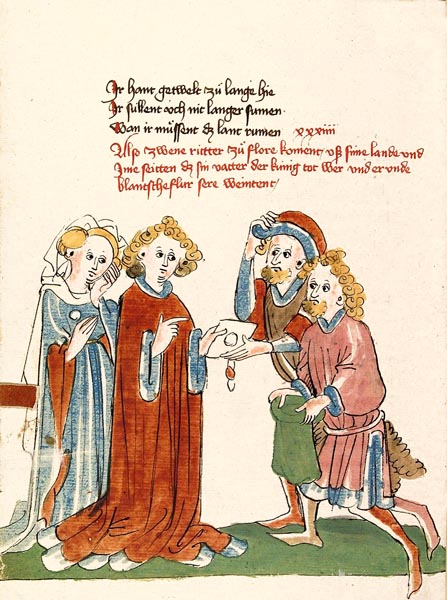
‘Two messengers bring news of King Fenix’s death’
The lovers seek leave to depart
He and his love grieved together.
Then, turning to the Emir, after,
Sought his gracious leave to go,
Though he proved reluctant, and so
Declared: ‘If you choose to remain,
Of your lot you’ll ne’er complain.
I will crown you king and queen
Of a richer realm, here, I mean;
A fine realm I will grant to you,
Crowns of gold will grace you too.
Ah!’ said he, ‘Floire, my fair friend,
Your presence, to this country, lend!
My dear counsellor you shall be,
And command my armies for me.’
Floire replied that he could not stay,
And yet his kindness would repay,
For he would gift him the cup, that he
Had brought there, from his far country,
Which he would buy from the porter,
To whom he’d gifted it earlier;
For a hundred golden coins he’d buy
The cup, and show his thanks thereby.
Floire showers gifts on his host
Floire now summoned his host to him,
And with gifts he showered him,
Twenty gold cups, twenty silver,
(Not taking ‘no’ for an answer);
Of bales of samite a good score,
With twenty bales of silk stuffs more,
Seven of sable pelts, free of moth,
Two hundred bales of purple cloth,
Such were his gifts to him, all told.
Then, a rich goblet wrought in gold,
He gave to the hostess Licoris,
And ten cloaks, vair and grey, with this.
And to all of their household, he
Gave cloth of superior quality.
He took his leave in fine manner,
And they accompanied him together,
The Emir joining their company,
Embracing him before his journey.
Great was the throng at his departure,
They kissed him, like to a brother,
Commending him to the Lord on high,
While fine, and noble, was his reply.
Floire went both sorrowful and glad,
One hour joyful, another sad.
He felt the loss of his dear father,
And grieved for his widowed mother,
Yet, at the same time, felt delight,
For Blancheflor now gladdened his sight.
Whom he had lost, as I’ve made plain,
Yet, by God’s grace, had found again.
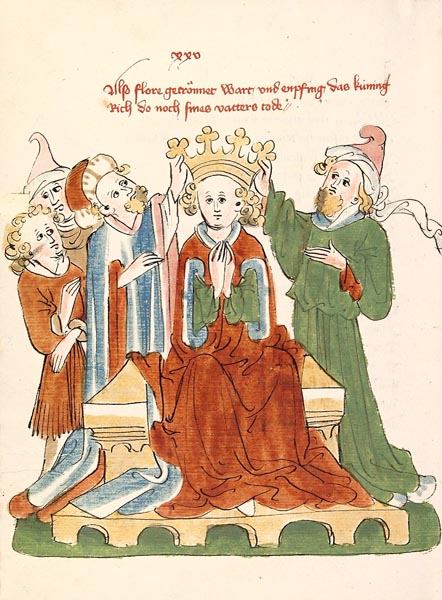
‘Floire is crowned king’
The lovers return home and Floire is crowned king
Floire and Blancheflor, hand in hand,
Now, sailed away from that far land,
Wandering long ere they did see
The shores of their own fair country.
There they were welcomed with delight
By the whole court, joyful at the sight.
And Blancheflor’s mother led the way
In celebrating that fair day,
Now that her daughter was set free,
Who’d languished in that far country.
Once Floire was home, life wrought amends,
For he rejoiced amidst his friends.
Now the royal crown was brought
To him, by the flower of the court.
So Floire was christened on that day,
Then crowned as king with great display,
And, for Blancheflor, heaven’s daughter,
Led a Christian life thereafter.
Four archbishops led the prayers,
Sound Christian knowledge was theirs,
They baptised him, in holy rite,
And crowned him king, as was but right.
One he was baptised, he brought
All the noblemen of his court
There together, and bade them love,
And believe in, the Lord above.
And in Mary, likewise, believe,
The faith, thereafter, ne’er to leave;
And, that God’s love be realised,
The court entire should be baptised.
Thus, the nobles, in full array,
Were baptised on that very day;
And know that folk lingered not
In accepting their ordained lot
(For any that would not receive
Baptism, nor in God believe,
Would be beheaded or flayed,
Or burnt, or otherwise ill-paid!)
The baptism of the people
Took more than a week, in total.
Once all the folk had been baptised,
And the realm was Christianised,
Floire gave away Blancheflor’s mother
In marriage to a man of honour,
His wealthiest and bravest duke,
The mightiest and most astute.
You would be as happy, or I,
As she whom Fortune raised on high;
Fortune who had brought her low,
Now raised her high, o’er those below,
For she saw her daughter a queen,
And as a duchess now was seen.
All gave thanks to the Lord above,
For His great mercy, and His love.
Here, of Floire, ends the story,
God bring us all to His glory!
The End of ‘Floire et Blancheflor’